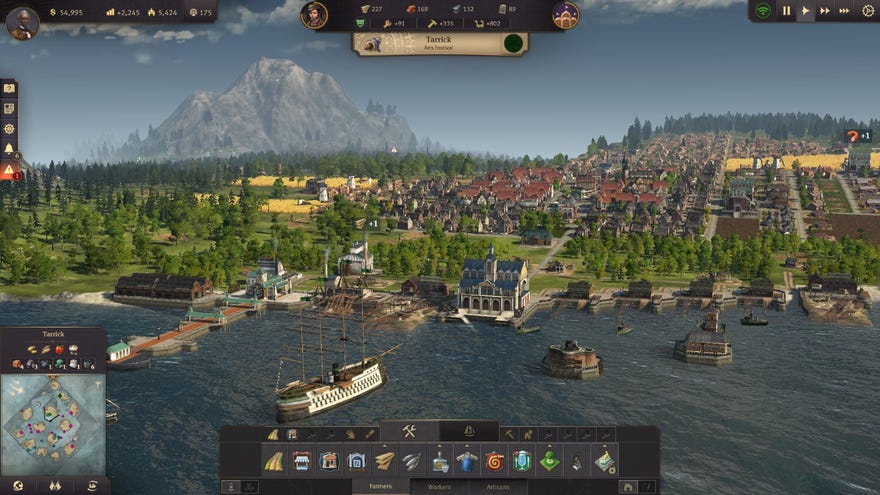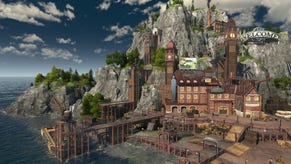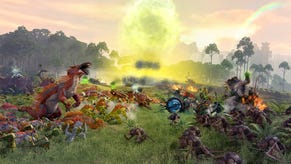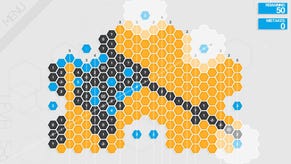Wot I Think: Anno 1800
Only the best for the captain's table
After playing through Anno 1800’s early game a few times (I’m one of those ghastly bastards who tends to compulsively restart if things aren’t going exactly my way), I started writing a very different article to the one you are now reading. The issue was, I hadn’t realised I was playing the early game at all. I had the feeling I’d seen the lion’s share of what there was to see, and was ready to pack up and write something along the lines of “great fun, but I’m not sure about replayability”. Then I played some more. And some more. And around six hours later, like someone who’s seen a handful of wasps in their house and so decides to go up into the attic to try to find out why, I was forced to drastically re-evaluate my position. Folks, Anno 1800 is… a lot.
Before I get too heavily into the nuts and bolts, I’ll put it plainly: Anno 1800 is the most impressive city-builder I’ve ever come across. I say that as a serious fan of the city-building genre, too. But I’m going to stop just short of saying it’s the best city-builder I’ve ever played, because I’m not sure yet. It very well might be, but I’m going to have to put in many more hours before I know whether its idiosyncrasies will make me fall hopelessly in love with it, or drive me away entirely. In that sense, it’s a bit like a brooding moneylord from a nineteenth century novel. Which is appropriate, because that’s pretty much what you play as in Anno 1800.
The game tasks you with navigating the full range of social and technological changes experienced by Western Europe during the nineteenth century, via the twin media of depositing buildings on a map, and moving boats around (well, not the full range of social and technological changes, but I’ll get to that much later). It starts with sawmills, sheep farms and schnapps, and ends with railways, electricity and champagne.
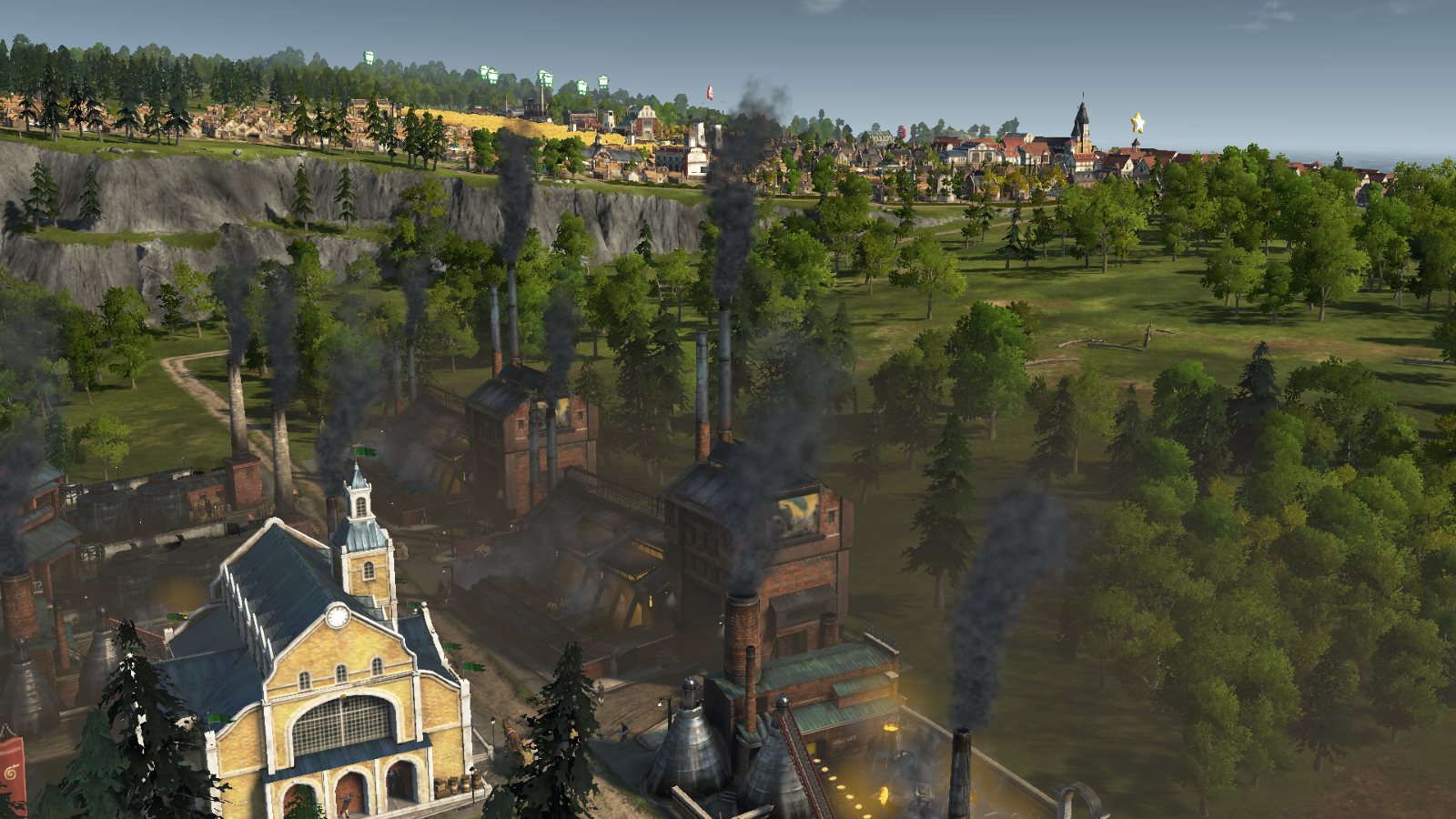
That’s a fairly ambitious remit, but based on the first couple of hours of play, there’s really not much to separate the game from the generic city-builder experience: you put your resource-producing buildings down, you put your houses down to supply them with workers, and then you use what they make to create further, more complex resource production setups. Repeat until you’ve done the industrial revolution.
Indeed, at first, the game feels like it’s had much of the genre’s usual complexity stripped away: as I laid out my starting settlement, I was surprised to find there was no need to devise public transport systems, or go through the usual rigmarole of making sure houses were near enough to workplaces to supply labour, while at the same time not being too near smelly or loud buildings that might upset the residents. I didn’t even have to worry about unemployment - the game seem delighted for me to have as many surplus citizens as I wanted. Interestingly, having these mechanics stripped away only made me realise how little I missed them.
(For all that praise, Anno 1800 still includes fire stations and police stations - my most hated mechanic in all city-builders - which must be plopped down at regular intervals in order to avoid the arbitrary chore of managing fires and riots. This isn't even a complaint about the game, so much as the genre as a whole. I just wish someone would think of a new way to handle fire and crime in games, beyond the binary solution of “put this object down to make this thing not happen”.)
Soon, however, the reason for this apparent simplicity became clear. Because if there’s a single, core concept that separates Anno 1800 from the rest of its cohort, it’s the idea of simultaneity. Not the Einsteinian concept of simultaneity, which I don’t really understand, but the principle of “loads of shit happening at once”. Because in Anno 1800, loads of shit is always happening at once, and that’s both the game’s biggest strength, and its biggest weakness.
To illustrate, here’s how a session tends to progress.
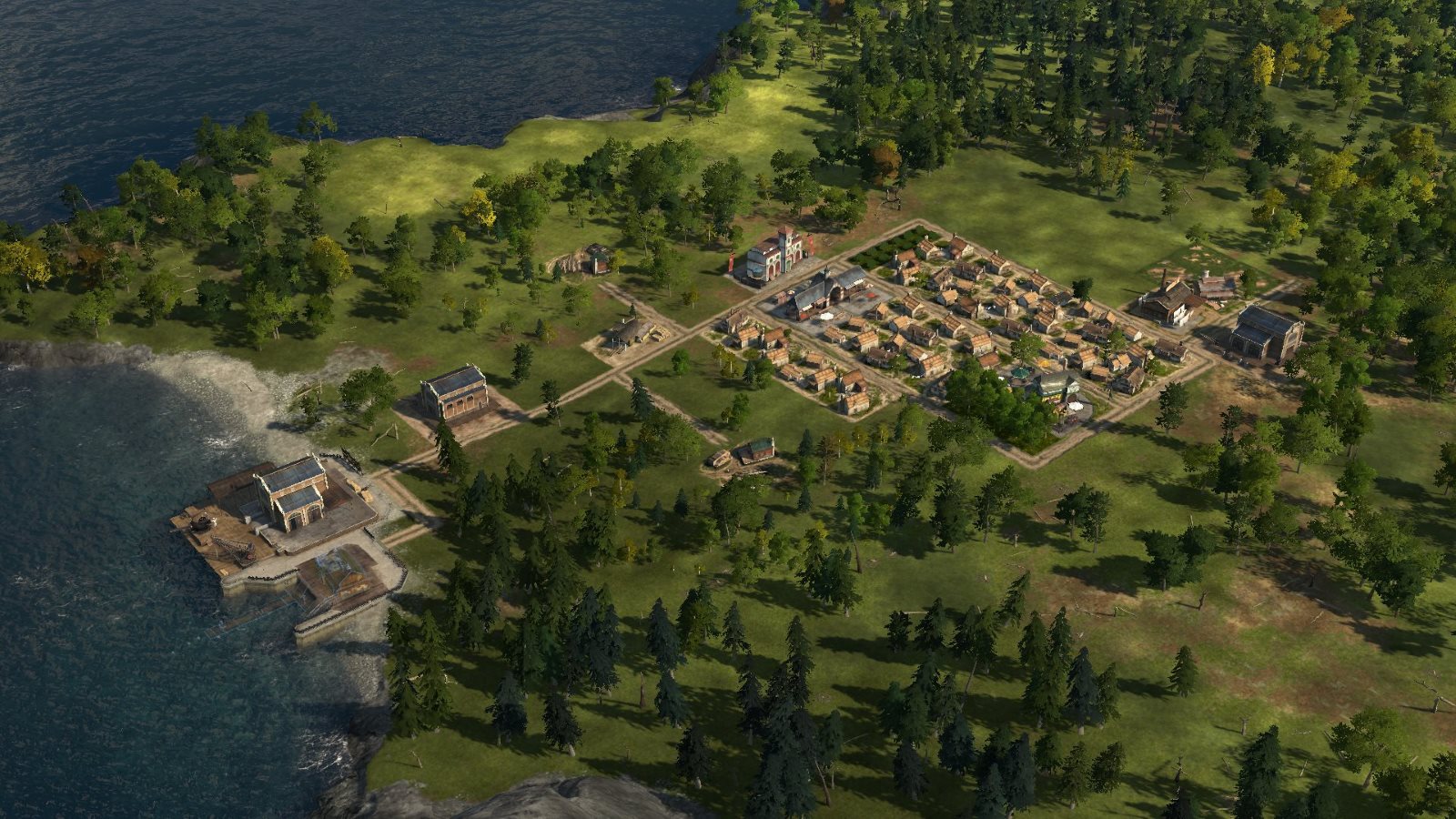
You start off with your first island, and it’s a fairly clear business, as I said. You get a housing grid and a market set up, a timber industry to allow for more construction, and then you work on fish to feed your settlers, and wool to clothe them. Then you grow spuds to make farmyard-strength blackout juice, and your houses level up to the second tier, opening up a whole new range of things to produce.
This process is all quite sedate, and gives you time to actually zoom in and enjoy the superbly beautiful, superbly detailed life of your city at street level. Or just to look at the sea. By Grond, the sea is gorgeous in this game. I was playing with graphics set to Dog Mode, as I spent most of my game time on a PC at the very lowest end of the game’s performance requirements, and it still looked outstandingly good.
After a while, though, you’ll discover your island doesn’t have the mineral deposits, or the soil types, required to produce the things you need to upgrade your housing to the next tier of the total five on offer. And so you load your initial ship up with the materials you’ll need to found a second colony that can supply these things, and you go out and settle it.
Now you’ve got a whole second island, with its own population and labour requirements, its own tier level, and its own pool of resources. In fact, unless you ship things between islands via boat, all that carries over is your treasury. And so you go about the business of repeating the early game city-constructing all over again, all the while continuing the development of your first colony, now that it has the imports it needs.
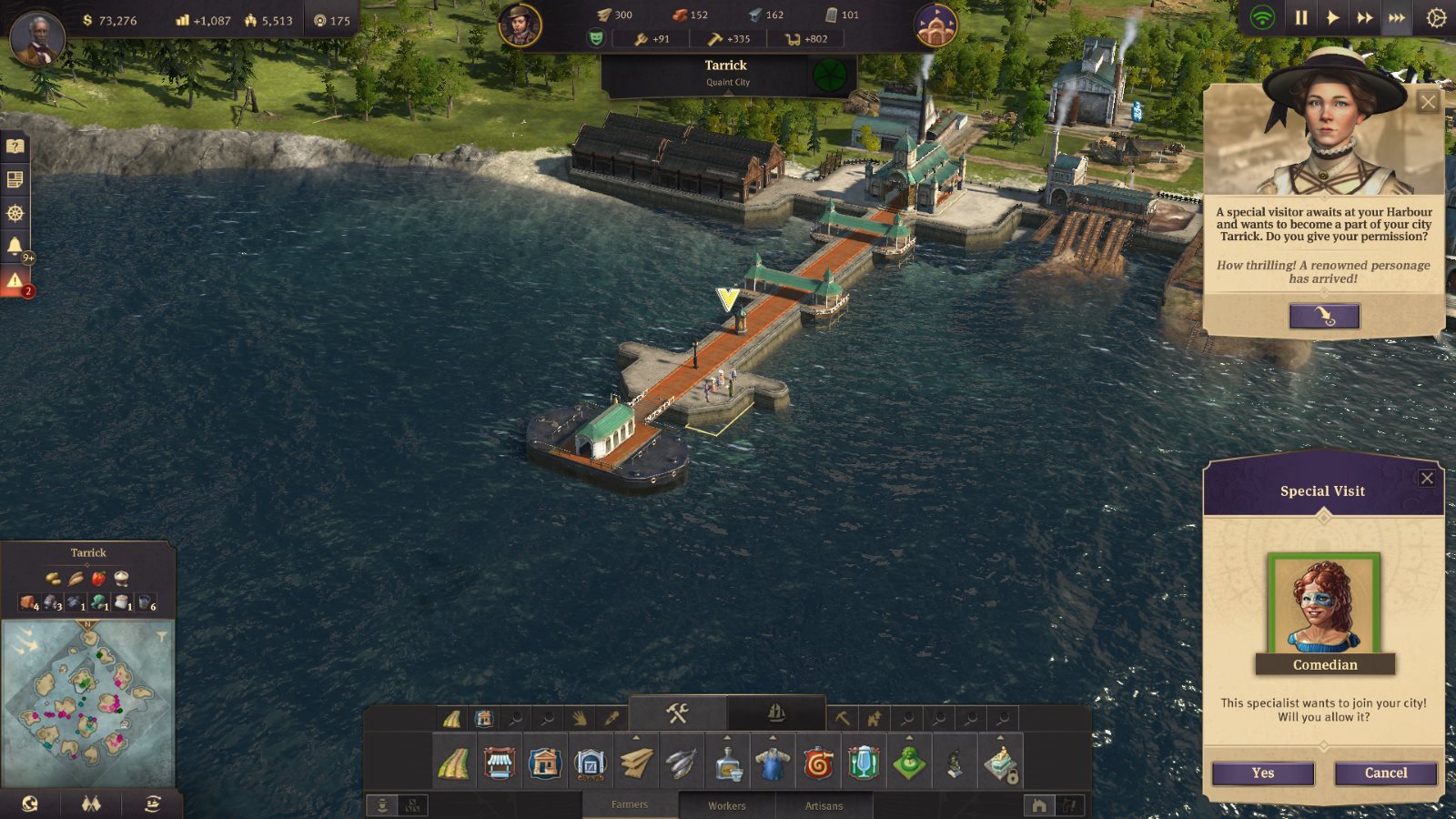
Then you’ll get the option to send an expedition to discover the new world, so you load up a ship to do that. When it arrives, there follows a sort of super-light Choose Yer Own Adventure minigame, in which you guide your ship through various multiple-choice narrative challenges, brought up by occasional prompts from a growling sea captain in the corner of the screen. Opening up Captain Bumeggs’ House of Decisions doesn’t pause the game either, so if one of your two colonies bursts into flames while you’re pondering whether to have your first mate stab a parrot or not, it’ll carry on merrily burning.
Then, back on the main map, one of your AI competitors (who will be building towns just like you are) will offer you a mission, and you’ll take it because you need the money. So you’ll have to click your ship around the map, RTS-style, in order to pick up floating crates for them. Halfway through, Captain Bumeggs will pop up again, demanding you resolve another nautical fiasco in the depths of the tropics.
Finally, you’ll be getting back to the development of your neglected second colony, when Pirates Will Happen, mangling half the sloops in your meticulously planned trading network. So you’ll have to repair your trade set-up, and sort out some warships to deal with the buccaneering sitch.
Then, at last, in the middle of all this, you’ll discover the new world - an entire new main map, (even more beautiful than the first, by the way) where you’ll want to set up a whole new colony to supply tobacco, sugar or other such luxuries for the toffs back home. This means starting from the early game all over again, with a whole new chain of structures and resources, while periodically switching maps to run your original cities, chase pirates, and fetch crates for AIs.
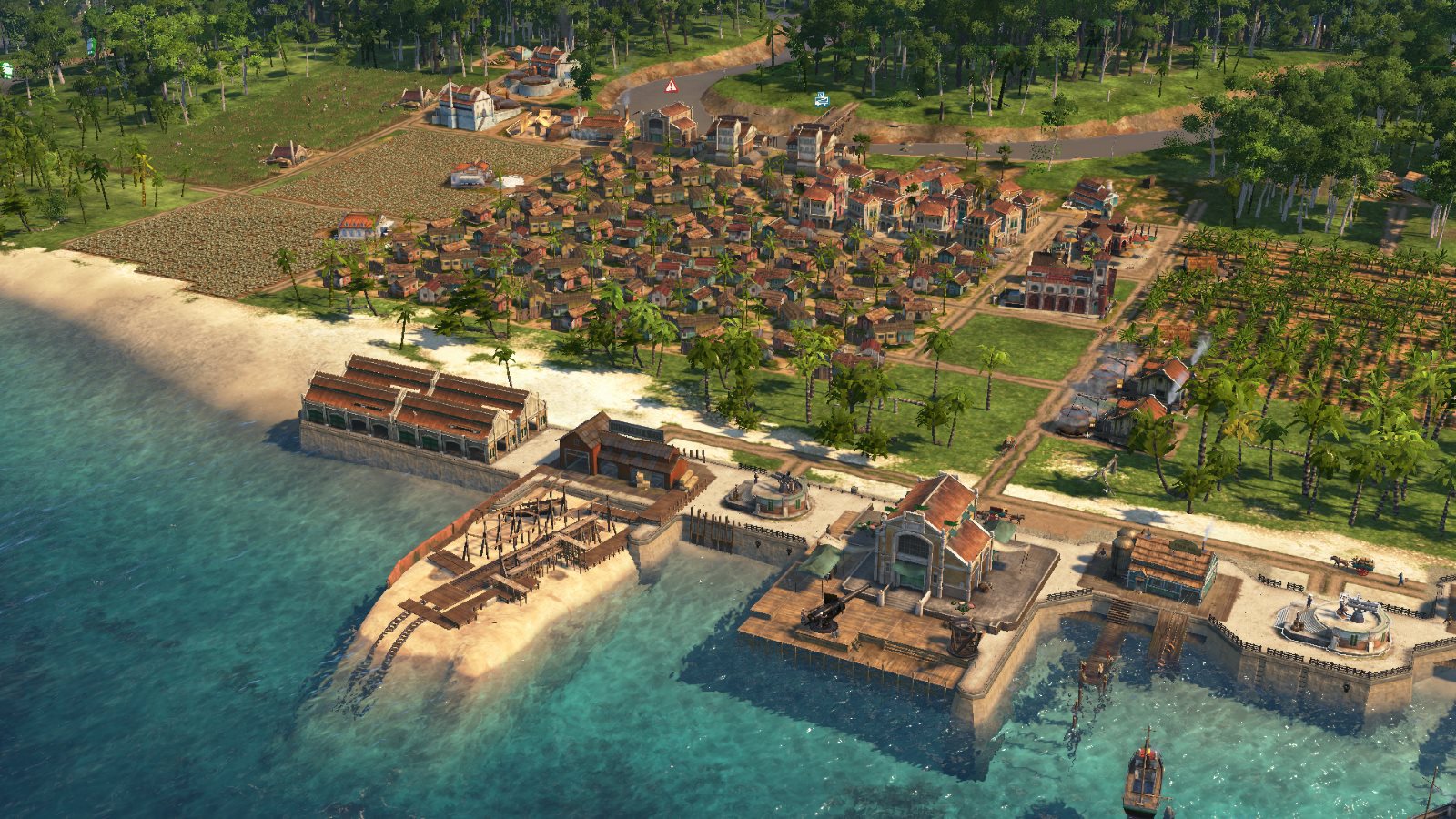
And then Captain Bumeggs, who you prayed had retired or caught scurvy, shows up yet again to coax you into further adventures. This time you’re after animals. For your zoo. Because your original city is now a tourist destination. Which means you need to move all your ugly factories away. To another island. In addition to the three you’re already running.
It goes on. Soon enough, you’re running four or five separate citybuilder sessions at once, while simultaneously playing a naval RTS, and occasionally a narrative adventure game DM’d by Captain Bumeggs. And you can’t pause any of them (well, you can pause, but it's the sort of pause screen that forbids you from meddling with the world outside of the boundaries of time). The UI does a superb job of keeping tabs on all the various things you need to do at any one time, but something will usually slip.
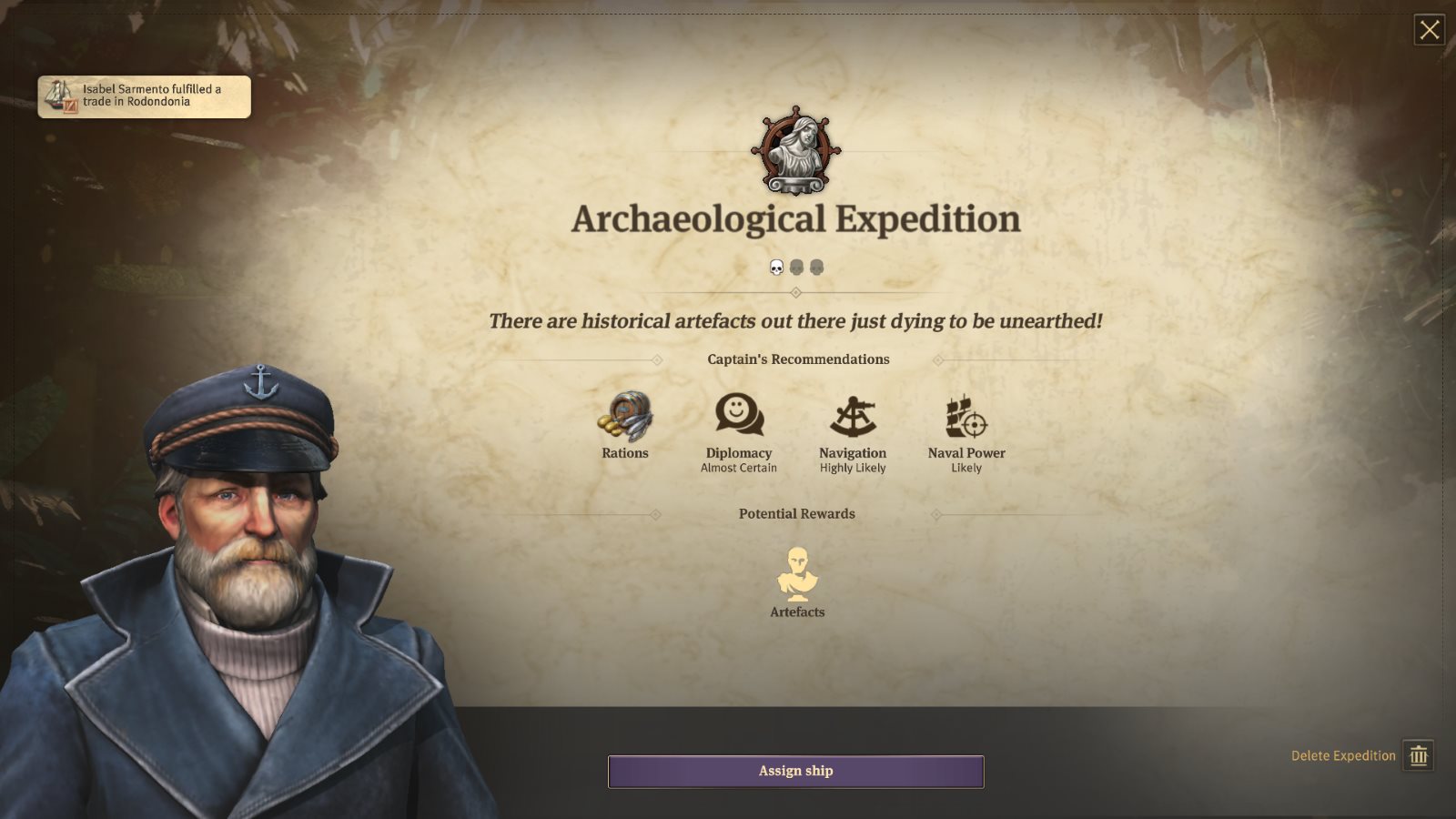
As I said at the start, it’s a lot. And you can’t approach the issue by just taking things at your own pace, because the AI will be relentlessly expanding, 4X style, and will war you right up if they get too far ahead.
It’s a shame, in a way. I found that after a while, I wasn’t taking any time at all to appreciate the fine detail of the game’s artwork, nor was I putting any time into laying out my cities beautifully, as I was so anxious to keep all of my many plates spinning. I couldn’t even take the time to properly read the entertainingly fruity ramblings of the good Captain, as I couldn’t finish a paragraph without a crisis unfolding elsewhere. It was all phenomenally engaging - the kind of stuff you can lose whole days to in a haze of dopamine - but at times it straddled the line between fun and work.

Furthermore, and this might be pedantry or incompetence on my part, but for a game that relies so much on constantly switching focus, it’s got a rubbish minimap. It’s too small, and because it represents your field of vision as a cone, it’s extremely hard to centre your vision on finer details such as moving ships.
But even without going into the plus points of all this simultaneity (and there certainly are plus points) it’s worth pointing out that all the negatives pretty much vanish when you consider playing Anno 1800 in multiplayer co-op mode. With another captain of industry at your side, and a little communication around the division of labour, you could focus entirely on city development, while your partner took on the mantle of Boat Lord. Or, you could decide to each focus on one of the world maps, if you both wanted to handle RTS and city-building duties.
Multiplayer co-op is one of the hallmarks of the Anno franchise, and it’s been confirmed that it will be added to Anno 1800 “after launch”. There’s still no firm date for when, but one would hope it would be soon, considering it seems like the ideal way to play the game. In the meantime, you can play Anno 1800 as a competitive multiplayer game right now, and even that seems like it would iron out a lot of the game’s hectic pace, if played between a group of people at a similar skill level.
While we’re on the subject, it's worth noting that sandbox and multiplayer are the only game modes currently worth extended play. The campaign mode, while lovingly made and by no means an afterthought, is essentially a very long and elaborate tutorial. It’s informative, but it spends a hell of a long time finding busywork for you in between the game’s vital lessons, and if you want to learn the ropes, it’s probably quicker just to jump in and fail. Horses for courses, I suppose.
Even as a single player experience, the whack-a-mole nature of Anno 1800 brings as many positives as negatives. Most obviously, the ability to run multiple concurrent colonies, all with their own development trajectories, means you can essentially play an entire Caesar-threesworth of city-building challenges during one mammoth session, with all of your successes feeding into one another.
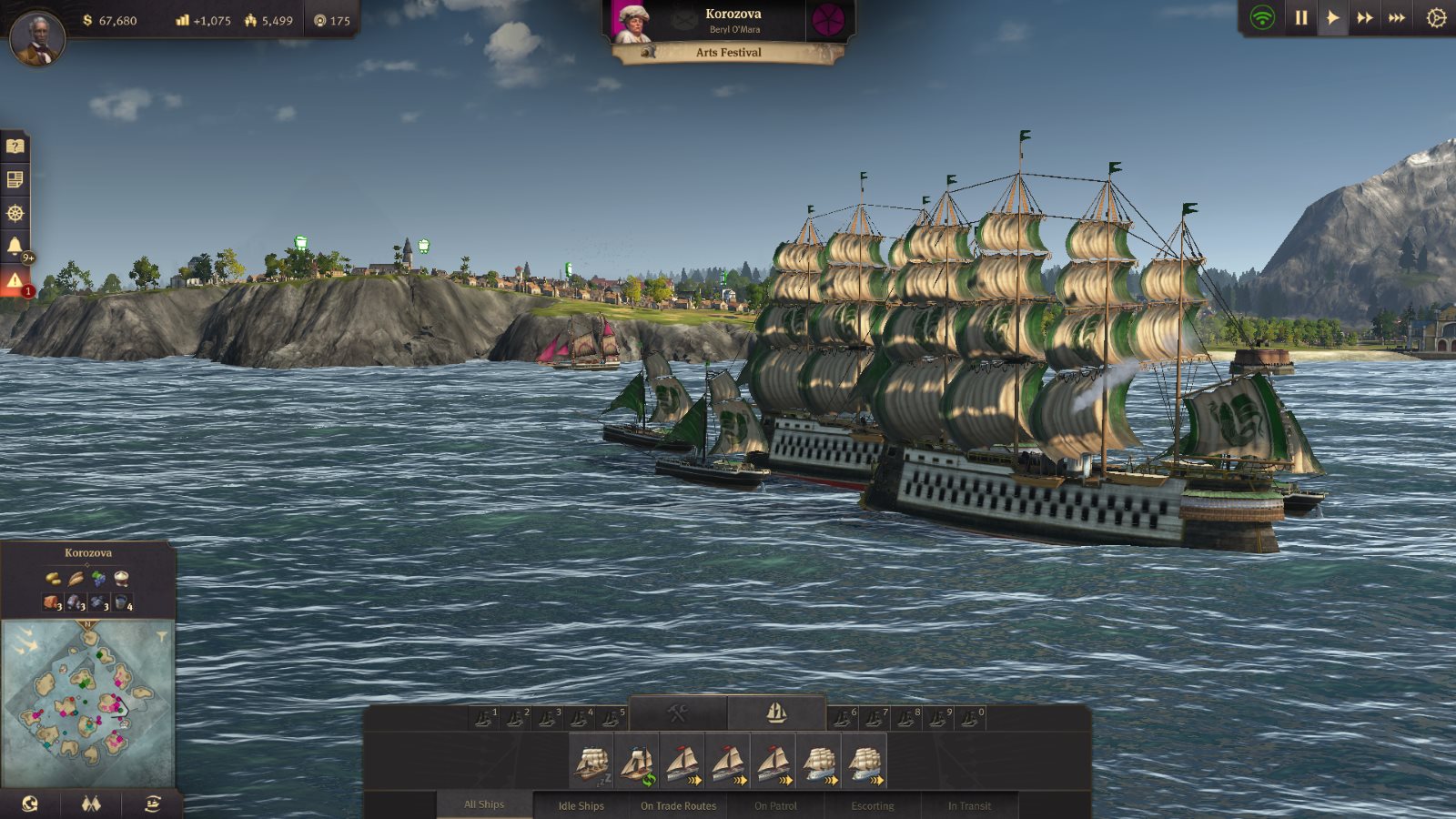
The plate-spinning also means you are never, ever bored during play, nor do you encounter the sort of miserable late-game malaise endemic to the strategy genre at large, in which you coast by for hours, miles better than anyone else in the game, waiting for the numbers to tell you that you’ve won.
Finally, if the game seems overly frenetic to a new player such as me… well, good? I might just be rubbish, and I certainly know I could do better. This sort of challenge, in which you can tread water but frequently realise you could be doing so much better, invites enormous replayability as you look to develop an instinct for a game’s rhythms. We all accept that’s a good thing in, say, Sekiro - so why not Anno 1800?
The only criticism I’d add here, is that with the premium the game puts on players learning to master its systems, it would be good to be given a few more resources with which to do so. The most obvious example of this is the need for more accessible data. In a game where the generation and trade of a huge variety of resources is central, I’d like more information available to me on how much of what I’m trading, what I’m overproducing, where demand is increasing, etc.
Happily, right after I drafted the last paragraph, I spotted a release from Ubisoft, confirming that much greater stats visibility will also be added to the game as free DLC some time after launch. While it's a shame it's not included from day one, it at least makes me feel a bit less of a nerd for feeling the lack of it. I'll be interested to see what's available: I’m not asking for the Full Paradox when it comes to data visualisation, but I’d like to be able to do at least a little more accountancy in this fun game about settling tropical islands.
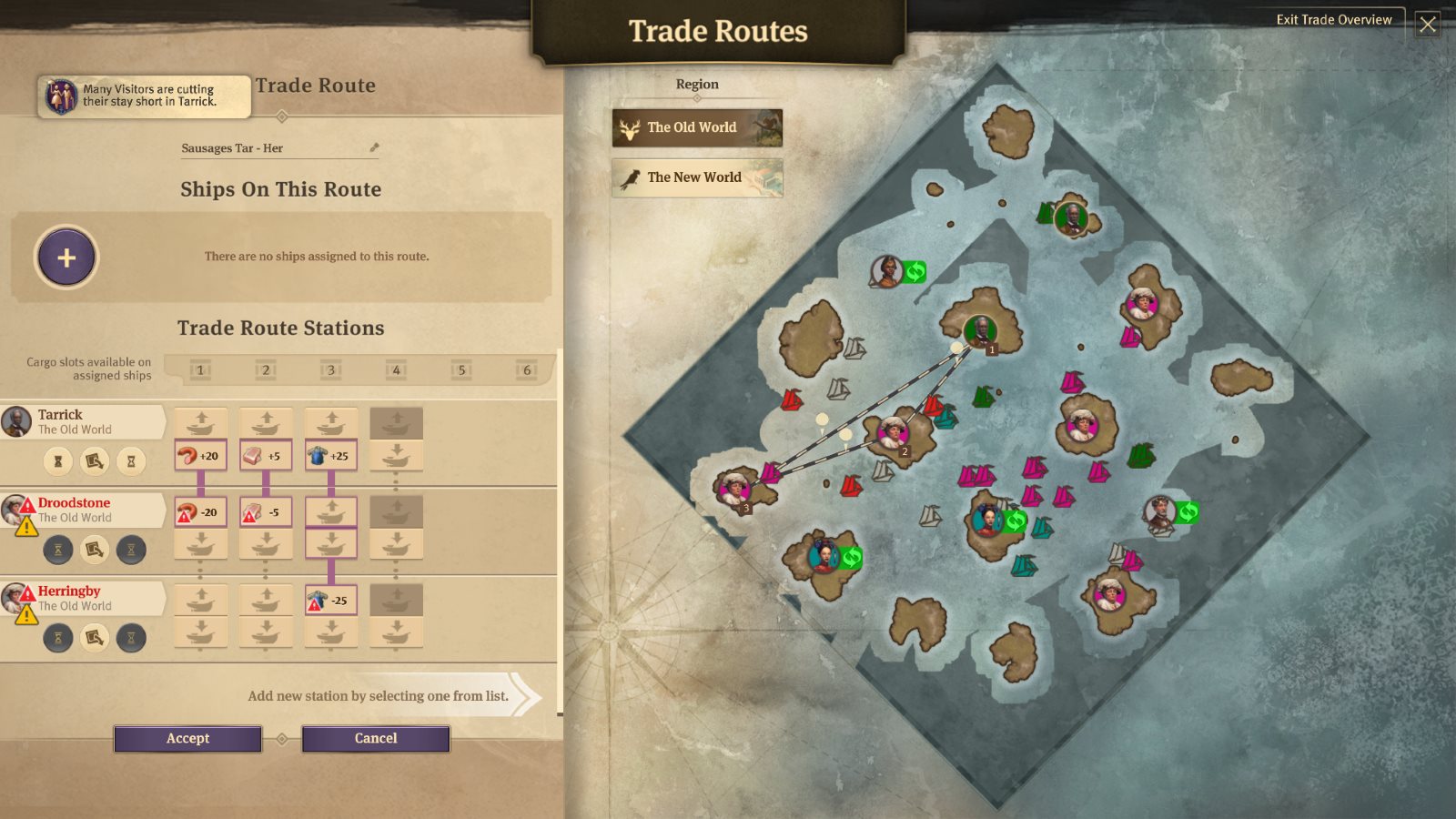
Speaking of settling tropical islands, I suppose I should mention my deepest point of unease with this game. And it almost feels unfair to do so, as it’s not really the fault of developers Blue Byte at all. But still, it should be said.
In a game which is emphatically about colonialism during the industrialisation of Europe, and which focuses heavily on the settling of implied Caribbean islands, it feels seriously fucking odd to ignore slavery.
It’s an elephant so large in this patch of history that the room has been built around it, and yet Anno 1800 sidles around its protruding, scrimshawed tusks as if there were nothing there. I’m certainly not saying the game should have allowed players to take part in the slave trade, as that would have been monstrous, but it feels almost as uncomfortable to just… pretend it didn’t happen?
The same goes for the genocide of indigenous peoples, the crushing misery of urban poverty, and the nightmare of mechanised war. The game does go some way to addressing the tension around workers rights in the aftermath of industrialisation, and has a genuinely amusing satirical take on propaganda, but otherwise paints a fairly Disneyland picture of what was, let’s face it, an extremely harrowing time for anyone who wasn’t a white man in a fancy hat.

Still, to Blue Byte’s credit, they’ve been very careful not to anchor this game within the bounds of either geography or history - there are no dates, and no countries besides the ‘old world’ and ‘new world’ mentioned at all. As a community rep for Anno said in an online Q&A last June, “Anno has always been more about a tongue-in-cheek reference to history than an accurate representation of it, hence why we will not feature real life personalities and nations.”
I think, if you were looking to make a game exploring the material complexities of industrialisation, but didn’t feel equipped to tackle the full psychic weight of it, that would be the fairest approach you could take. But still, it doesn’t quite sit easily.
Ultimately, I wouldn’t go into criticism this detailed if I didn’t think this was a game worthy of it. Anno 1800 could have been any one of a hundred shades of mediocre, and I would have had a much lighter, breezier time talking about it. But whether I end up adding it to my list of perennial must-plays, or retiring it in despair at the whimsical capering of Captain Bumeggs, it’s an undisputed heavyweight, and an experience I’d recommend to anyone.
